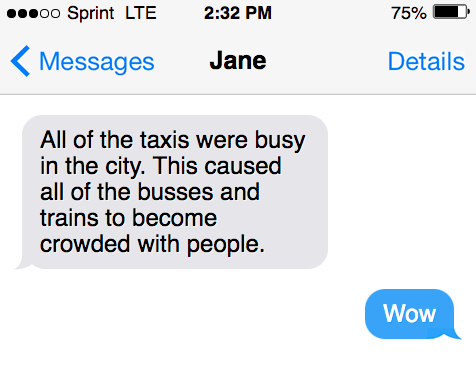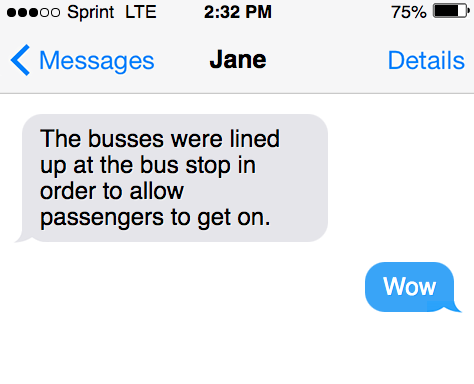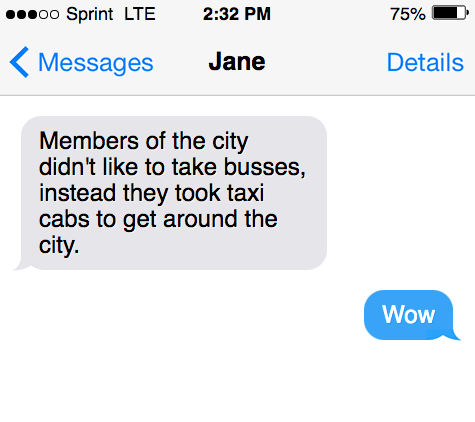Is it busses, buss’, or busses’? What is the correct grammar in the English language? When referring to multiple busses, it can be hard to understand how to know how to refer to the plural form of the base word “bus.”
What is the definition of the word “bus?”
Merriam-Webster defines “bus” as to “transport by bus, busing kids to school.”
A bus is a large vehicle designed to carry passengers, typically on a scheduled service, between two points. Buses can be used for a variety of purposes, including school buses, city buses, and long-distance coaches.

The etymology of the word “bus”
The word “bus” is thought to come from the Latin word “omnibus,” which means “for all.” The first recorded use of the word “bus” was in Nantes western France in 1827. In 1832, the word “bus” began to gain in popularity with the reference of “public street carriage” as its meaning.
Originally a colloquial abbreviation of “omnibus” (q.v.).
Omnibus originally meant “for everybody” (dative) or “by Omnes” (ablative).
Use of the word “bus”
The use of the word “bus” began to gain popularity in 1838 when travelers would start to refer to the transportation method as “to travel by omnibus.”
In 1888, “traveling by omnibus” or the verbal form of the base word “bus,” “busing” became to be. For example, “busing children from one place to another.”
What are the tense forms of the word “bus?”
The word “bus” can be used in a variety of tenses, including present, past, and future.
- Present Tense: I bus my children to school every day.
- Past Tense: I bused my children to school yesterday.
- Future Tense: I will bus my children to school tomorrow.
What is the plural form of the word “bus?”
The plural form of the word “bus” is “buses.” When referring to multiple buses, you would use the plural form of the word. For example, “There are two buses that will take children to school today.”
What is the possessive form of the word “bus?”
The possessive form of the word “bus” is “bus’s.” This is typically used when referring to something that belongs to the bus, such as “the bus’s wheels.”

What is the correct grammar in the English language when referring to multiple buses?
The plural of the noun “bus” is “buses.”
When referring to multiple busses, the correct grammar in the English language is to use the plural form of the word, “buses.”
For example, “There are three buses that will take children to school today.”
When to use the word “buses?”
The word “buses” should be used when referring to more than one bus. For example, “I saw three buses on my way to work this morning.”
When not to use the word “buses?”
The word “buses” should not be used when referring to a single bus.
For example, “I saw a bus on my way to work this morning.”
How to use the word “buses” in a sentence?
The word “buses” can be used in various ways.
For example, you could say, “I saw three buses on my way to work this morning,” or “I’m going to take the bus to work today.”
What other words can be used in place of the word “buses?”
Other words used in place of “buses” include coaches, shuttles, and vehicles.

When to use the word “busses”
The word “busses” in the plural form of the word “bus” can get used when using the third person singular present tense conjugation of the verb “bus.”
For example, “There are many shuttle busses available to take us to the park.”
Or another example sentence, “My father busses the children from one place to another.”
The double “s” letters should get used like “fusses” or “trusses.” These make it clear that the word should get pronounced with a short vowel sound.
“Busses” is the preferred plural form of the word “bus.”
What about “busses'” with an apostrophe?
Including the apostrophe in the plural form of the word “bus” is the incorrect spelling of the word. It would get pronounced “busseses,” which is incorrect in American English.
Verbs like “bussing” or “bussed” are used as alternative tenses. They are common to use in American vocabulary. For example, “I am bussing tables.”
“Bussing” can often times have drastically different meanings. For example, “bussing tables” could mean to clean a table of its silverware and dirty dishes.
Pronunciation note: A double consonant makes it clear that the word should get pronounced with a short vowel sound. Final constants in the word “bus” are often “-es,” “-ed,” or “-ing.” For example, “bussed,” “busses,” and “bussing.”
Sentence examples using “busses”
“Busses” is the correct spelling when referring to the plural form of the word “bus.”
- “The busses were lined up at the bus stop in order to allow passengers to get on.”
- “All of the taxis were busy in the city. This caused all of the busses and trains to become crowded with people.”
- “Members of the city didn’t like to take busses, instead they took taxi cabs to get around the city.”
Sources
- Bus Definition & Meaning – Merriam-Webster
- bus | Etymology, origin and meaning of bus by etymonline
- What is the origin of the word ‘bus’? | Notes and Queries
- Bus – Wikipedia
- Dative case – Wikipedia
- ablative – Wiktionary
- Busser – Wikipedia
Inside this article
Fact checked:
Content is rigorously reviewed by a team of qualified and experienced fact checkers. Fact checkers review articles for factual accuracy, relevance, and timeliness. Learn more.
Core lessons
Glossary
- Abstract Noun
- Accusative Case
- Anecdote
- Antonym
- Active Sentence
- Adverb
- Adjective
- Allegory
- Alliteration
- Adjective Clause
- Adjective Phrase
- Ampersand
- Anastrophe
- Adverbial Clause
- Appositive Phrase
- Clause
- Compound Adjective
- Complex Sentence
- Compound Words
- Compound Predicate
- Common Noun
- Comparative Adjective
- Comparative and Superlative
- Compound Noun
- Compound Subject
- Compound Sentence
- Copular Verb
- Collective Noun
- Colloquialism
- Conciseness
- Consonance
- Conditional
- Concrete Noun
- Conjunction
- Conjugation
- Conditional Sentence
- Comma Splice
- Correlative Conjunction
- Coordinating Conjunction
- Coordinate Adjective
- Cumulative Adjective
- Dative Case
- Determiner
- Declarative Sentence
- Declarative Statement
- Direct Object Pronoun
- Direct Object
- Diction
- Diphthong
- Dangling Modifier
- Demonstrative Pronoun
- Demonstrative Adjective
- Direct Characterization
- Definite Article
- Doublespeak
- False Dilemma Fallacy
- Future Perfect Progressive
- Future Simple
- Future Perfect Continuous
- Future Perfect
- First Conditional
- Irregular Adjective
- Irregular Verb
- Imperative Sentence
- Indefinite Article
- Intransitive Verb
- Introductory Phrase
- Indefinite Pronoun
- Indirect Characterization
- Interrogative Sentence
- Intensive Pronoun
- Inanimate Object
- Indefinite Tense
- Infinitive Phrase
- Interjection
- Intensifier
- Infinitive
- Indicative Mood
- Participle
- Parallelism
- Prepositional Phrase
- Past Simple Tense
- Past Continuous Tense
- Past Perfect Tense
- Past Progressive Tense
- Present Simple Tense
- Present Perfect Tense
- Personal Pronoun
- Personification
- Persuasive Writing
- Parallel Structure
- Phrasal Verb
- Predicate Adjective
- Predicate Nominative
- Phonetic Language
- Plural Noun
- Punctuation
- Punctuation Marks
- Preposition
- Preposition of Place
- Parts of Speech
- Possessive Adjective
- Possessive Determiner
- Possessive Case
- Possessive Noun
- Proper Adjective
- Proper Noun
- Present Participle
- Prefix
- Predicate



